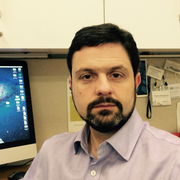
"TNFa confers pathogenic memory to RA FLS by inducing super-enhancers"
Year: 2015
Institution: Hospital for Special Surgery
Principal Investigator: Dr. George Kalliolias
Research Category: Basic Science
Rheumatoid arthritis (RA) is a common disabling disease with increased mortality and significant societal cost burden. Despite the introduction of novel biologic drugs most patients never experience sustained remission of their symptoms. Thus, the introduction of a novel therapeutic paradigm is a pressing necessity. Our proposed project aims to characterize molecular targets in synovial fibroblasts (FLS) with therapeutic potential. The role of FLS is critical in RA pathogenesis, but research on FLS is limited and underfunded. The chronic unremitting character of RA is a puzzling issue for scientists and clinicians. We propose a novel concept to explain the perpetuation of RA inflammation: the joint inflammatory milieu “primes” the chromatin landscape of FLS, allowing unopposed and continuous transcription of pathogenic genes that fuel arthritis.
Our specific aims are:
- to identify whether the inflammation-induced memory is transient and reversible or permanent and irreversible
- to identify the molecular mechanism that drives pathogenic memory in RA FLS.
We will address these questions with a series of experiments using primary human FLS derived from RA patients and will investigate whether therapeutic manipulation of FLS chromatin will abrogate “pathogenic memory”.
The above project description has been supplied by the Principal Investigator
